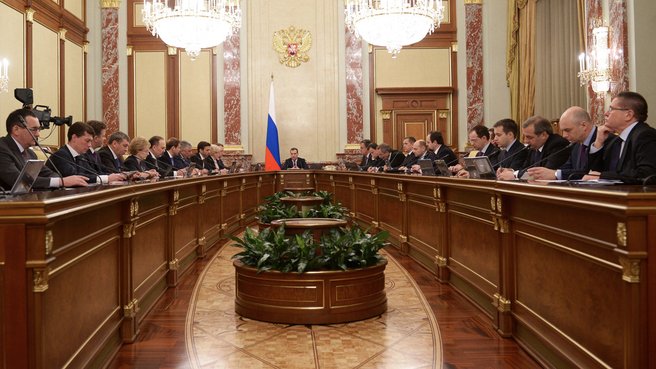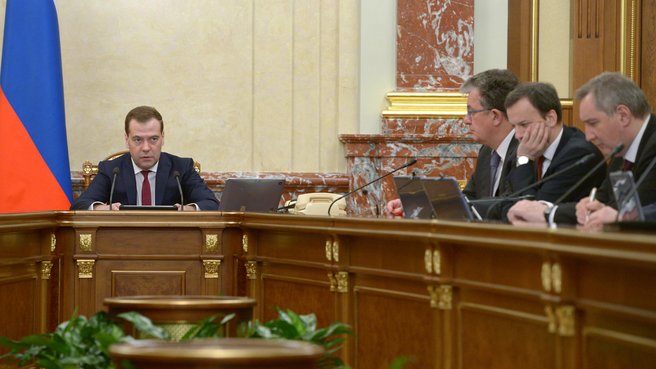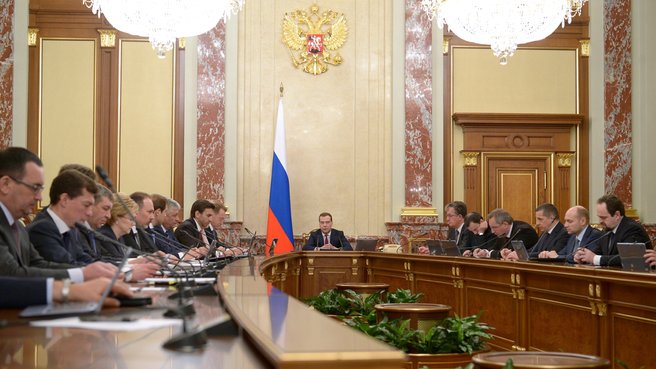The main item on the agenda – ERA-GLONASS Accident Emergency Response System.
Dmitry Medvedev’s opening remarks:
Good afternoon.
Before we start discussing the agenda, I’d like to draw your attention to the execution of the federal budget. Yesterday we spoke about the cash execution of the budget in January, which leaves much to be desired, to put it mildly. There has been a slight change for the better in February but it’s too early to relax, although it’s about the same as last year. Therefore, the Ministry of Finance and the Ministry of Economic Development should step up their work with those ministries that are not properly executing the budget, and should demand that they make consistent use of budget investment. I’d like to hear a separate report on this issue. Mr Siluanov, prepare the report please.
Dmitry Medvedev: "Prompt assistance will reduce traffic mortality and injury rates."
Now let’s move on to the agenda. Today we’ll discuss the operation of the ERA-GLONASS Accident Emergency Response System to decide how it should develop this year and beyond.
The main task of this system is to automatically transmit information on traffic accidents to emergency services. Immediately after an accident, an emergency call system, installed in cars, automatically determines the time of the accident and the coordinates of the accident using GLONASS and GPS signals. The system transmits this information to the ERA-GLONASS system, which instantly sends it to emergency services. At that point operators contact the victims and rescue teams and provide support to them if necessary.
I won’t speak at length on this subject. Everyone understands how important it is for rescue and medical workers to obtain information quickly about an accident and arrive on site. There is a notion of a golden hour during which it is possible to render quality medical aid with high chances of recovery. Prompt assistance will reduce traffic mortality and injury rates. To sum up, the system should not let us lose a minute of this golden hour.
There is one more subject that I’d like to mention at the beginning: legislation on citizenship. <...>Today we’ll take one more step in this direction. We’ll discuss a draft federal law that makes it easier to receive Russian citizenship for foreign and stateless persons that are qualified as Russian speakers.
Basically, we’ve resolved this task. It took us about four years from start to finish. Today we have the infrastructure for this system in place in the entire country. Substantial investment – about half a billion roubles – is required to improve it and make it efficient. The federal budget allocations for this purpose are 172 million roubles, so we must determine the sources of funding that are required for the further development of this system.
The Minister of Transport and the Minister of Healthcare will submit their proposals on this score.
Dmitry Medvedev: "We’ll discuss a draft federal law that has simplified procedures for receiving Russian citizenship for foreign citizens or stateless persons that are qualified as Russian speakers."
There is yet another issue that I’d like to mention at the beginning. It also concerns legislation on citizenship. We discussed this issue last time and are reviewing it again now. I’m referring to simplified procedures for receiving citizenship in this country. First of all, these procedures apply to highly qualified specialists that are in high demand: those who graduated from Russian and Soviet higher educational institutions and have worked in this country for at least three years.
Today we’ll take one more step in this direction. We’ll discuss a draft federal law that has simplified procedures for receiving Russian citizenship for foreign citizens or stateless persons that are qualified as Russian speakers. I’m referring to people who permanently lived, or whose relatives lived, in Russia in the past, or on territories that belonged to pre-revolutionary Russia or the Soviet Union.
A special commission will decide if they can be qualified as Russian speakers based on the results of an interview. Those who pass it successfully will receive a special visa for entry into Russia. Moreover, they will be able to receive residence without applying for temporary residence. It will take three months for them to become citizens. Naturally, to do so they will have to renounce their foreign citizenship.
We’ll consider the possibility of expanding the list of applications for registering instruments of civil status that could be submitted online.
Dmitry Medvedev: "We’ll consider the possibility of expanding the list of applications for registering instruments of civil status that could be submitted online. The proposed amendments to the law will allow our citizens to save time by avoiding visits to civil registry offices in some cases. They can submit online applications for getting married or divorced, or to register childbirth or child adoption."
The proposed amendments to the law will allow our citizens to save time by avoiding visits to civil registry offices in some cases. They can submit online applications for getting married or divorced, or to register childbirth or child adoption. This will allow civil registry offices to conduct their records online as well. To sum up, this means the development of the online circulation of documents.
<…>













